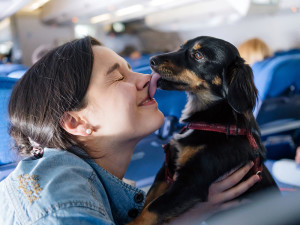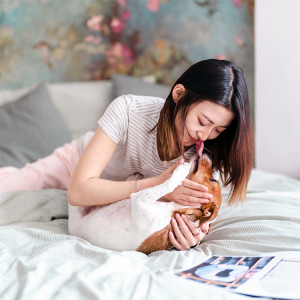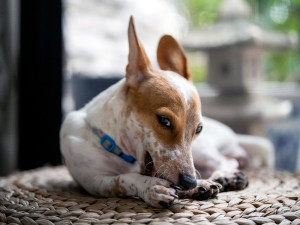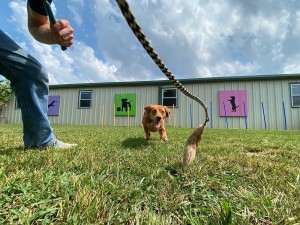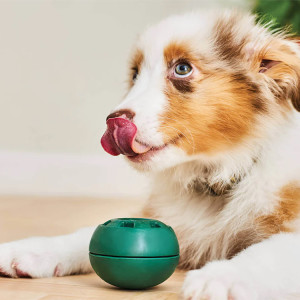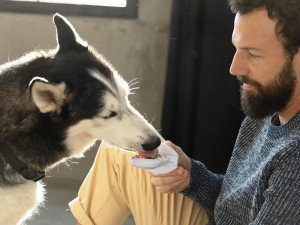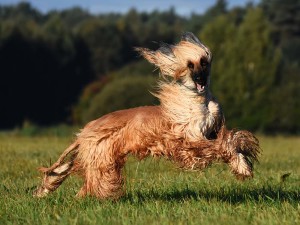Why Does My Dog Lick the Floor?
How does that taste, bud?

Share Article
In This Article:
Why Is My Dog Licking the Floor? When to Consult a Veterinarianopens in new tab Preventing Excessive Floor-Licking
Have you ever caught your dog obsessively licking the floor, leaving you wondering what's behind this peculiar behavior? While occasional floor-licking is generally harmless, excessive or persistent licking may indicate an underlying issue that requires further investigation.
Why is my dog licking the floor?
Dog parents often wonder if there’s an official medical term for some of the weird stuff their dogs do. Usually, there’s not. But there is a commonly used term for when a dog is constantly licking the floor — excessive licking of surfaces, or ELS. Pretty fitting.
Dogs with ELS will lick objects or surfaces for an unusual amount of time or frequency, or with unreasonable enthusiasm. ELS, by itself, is not a disease but a behavior that is often a consequence of an underlying issue.
Here are some possible reasons your dog may be obsessively licking the floor:
Flavors
Dogs use their keen sense of smell to seek out food, especially at home. They know which of their people are messy eaters and where the crumbs are likely to be. Dogs may lick the floor in search of the tiniest morsels of food, leaving nothing behind. They can also sense if that sauce that was spilled on the floor wasn’t cleaned up as well as you think. Speaking of cleaning, consider pet-safe cleaners when wiping up spills.
Nausea
Nausea will make some dogs lick a lot; they’ll lick their lips, the air, and odd surfaces. Some dogs may lick the floor excessively to try to calm their queasiness. Nausea can stem from many causes including dietary changes, dietary indiscretion, metabolic disease, or toxin ingestion.
Gastrointestinal disease
Dogs with underlying gastrointestinal disease may also lick the floor excessively. Diseases of the gut can cause nausea and discomfort that trigger this behavior. A study conducted opens in new tab at the University of Montreal's Veterinary Teaching Hospital looked at 19 dogs with ELS (Excessive Licking Syndrome). The study found that 17 of the dogs had an underlying gastrointestinal disease. These diseases included inflammatory bowel disease, pancreatitis, Giardia infections, and infiltrative diseases where abnormal cells infiltrated the lining of intestinal walls. The study also revealed that many of the dogs’ compulsive licking improved after their underlying disease was treated.
Dental disease/Oral pain
Dogs experiencing oral pain may drool and lick excessively. The pain can occur from periodontal disease, tumors, ulcers, or foreign objects stuck in the mouth. If a dog won’t stop licking the floor and is coughing, they may have irritation in their throat or esophagus.
Neurological disorders
Behavioral changes in dogs can stem from seizure activity, brain tumors, or inflammatory diseases affecting the central nervous system. Dogs with partial or focal seizures may display odd repetitive behaviors like biting the air or licking the floor. These behaviors will continue despite calling to get their attention.
Senior dogs can develop cognitive dysfunction syndrome, which is similar to dementia in people. These aging dogs can display abnormal behaviors like wandering, staring off, house-soiling, and excessive licking.
Compulsive disorders
Compulsive disorders in dogs lead to behaviors that are exaggerated, inappropriately repetitive, and out of context. These behaviors can include licking surfaces, chasing shadows, chasing their tail, pacing, and over-grooming to the point of self-trauma. Initially, dogs may display these behaviors out of fear, anxiety, excitement, or attention-seeking, but with time, they get out of control.
Anxiety and boredom
Dogs may also repeatedly lick the floor to alleviate stress and boredom. Licking can be triggered by stressful situations like environmental changes, new people, thunderstorms, or fireworks. The act of licking releases endorphins, “feel-good” hormones that can help ease times of stress.
Sometimes, dogs will constantly lick the floor out of lack of something better to do. Dogs that lick out of boredom should be provided with mental stimulation and physical activity before licking progresses to more destruction chewing, scratching, and digging.
Excessive hunger
Certain conditions can make dogs experience polyphagia, which is a term for excessive hunger. These conditions include diabetes mellitus, Cushing’s disease, exocrine pancreatic insufficiency (EPI), and hypethyroid disease (rare in dogs). Steroids, like prednisone, can also cause excessive hunger. When there’s no food in sight, dogs with polyphagia may resort to licking the floor in search of a snack.
When to consult a veterinarian
It's normal and not a big deal if a dog licks the floor occasionally. But when the behavior becomes excessive, it should be checked out. If you’re concerned your dog is showing signs of ELS, talk to your vet. Your dog should definitely be examined if you notice these signs:
Licking that interferes with normal activity
Licking that continues despite trying to get a dog’s attention
Other compulsive behaviors like tail-chasing and over-grooming
Foul odors from the mouth
Pain
Vomiting or diarrhea
Poor appetite
Excessive thirst and urination
Your vet will likely want to rule out medical causes before deeming constant floor licking as a strictly behavioral issue. A medical history and physical exam help determine the next steps. If there is concern for a gastrointestinal or metabolic issue, then bloodwork, urinalysis, fecal exam, and imaging (radiographs or ultrasound) may be recommended.
If there is concern for an underlying neurological condition, referral to a veterinary neurologist may be necessary for an MRI and spinal fluid sampling. If medical issues are ruled out, then the focus can shift to environmental and behavioral modification techniques.
Preventing excessive floor-licking
Excessive floor-licking in dogs can’t always be prevented, but ensuring that your dog’s needs are being met can help reduce the risk of conditions that trigger excessive licking.
Stay current on preventative care.
Provide regular dental care (including teeth brushing at home and professional cleanings).
Feed your dog a balanced, high-quality diet.
Avoid going overboard with treats and snacks.
Provide plenty of physical exercise and mentation stimulation.
Minimize stress.
FAQs (People also ask):
Why do dogs lick the floor?
Dogs can lick the floor for many reasons including gastrointestinal disease, oral pain, neurological disorders, stress, excessive hunger, and boredom. Sometimes, they just find crumbs on the floor though.
Why is my dog frantically licking the floor?
A dog may frantically lick the floor to ease nausea, oral pain, or anxiety. If frantic licking is persistent, it may be a sign of compulsive disorder or cognitive dysfunction.
Why does my dog lick me?
Dogs often lick the people they love as a sign of affection. Licking releases endorphins that can make cuddle time extra soothing. Dogs may also lick people to get attention or simply say “hello.”
References:
Gastrointestinal Disorders in Dogs with Excessive Licking of Surfacesopens in new tab
Recognizing Compulsive Disorders in Dogs and Catsopens in new tab

Dr. Alycia Washington, DVM, MS
Alycia Washington, DVM, is a small animal emergency veterinarian with over ten years of experience based in North Carolina. She works as a relief veterinarianopens in new tab and provides services to numerous emergency and specialty hospitals. She also works as a veterinary writer with a focus on educating pet owners, and is the author, under the name A. C. Washington, of the children’s book Dr. Jett, Monster Vet.
Related articles
![training dog chewing blanket]()
Why Does My Dog Chew On Blankets?
A (seemingly) unstoppable nibbling obsession with all the blankets.
![Large brown dog looking at vacuum cleaner.]()
These Common Household Noises Are Super Stressful for Dogs, Study Finds
Fireworks and thunderstorms aren’t the only things that make them say, “No, thanks!”
![Golden Retrieve dog running in the grass outside, playfully chasing a flirt pole held by a man in blue jeans]()
Your Dog Is Bored. Here’s How to Solve That
Get out the toys and puzzles.
![Mini shepherd laying on ground licking pupsicle toy]()
The Pupsicle Will Soothe Puppies Who Need to (Literally) Chill
Woof’s innovative fillable design will help dogs de-stress and their parents save money.
![A bearded man in a gray sweater and yellow pants sitting on the floor and holding a Groov Training Aid in "lilac" from Diggs Pet, which is like a grooved plastic popsicle with treats smeared in, while his Husky dog licks it]()
9 Stress Toys For Dogs That Are Cheaper Than Therapy
The toys that’ll help your pup chill out after a long day of being a dog.
![Afghan hound dog mid jump in an open grass field]()
Overexcited Dog? How to Calm A Dog Down
If your dog loses their sh*t over anything—from a squirrel to a guest. Here are some tips to curtail that.
